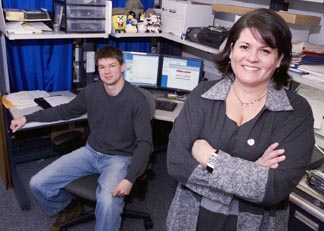Change your computer backup and help save $1.5 million
By Lauren Gold

If you have ever lost a computer file, you know backup systems are crucial. But usually they come at a price: Either they frustrate users by slowing down the system during the day, or they waste energy by requiring that computers be left on all night and on weekends.
Three years ago, staff in the Division of Facilities Services (DFC) solved both problems. Now, with renewed attention on energy conservation across campus, they hope other departments follow their example. If they do, it could save Cornell some $1.5 million a year in energy costs.
The idea behind the improved system is simple: Instead of backing up each of DFC's 550 computers, backups occur only on its 16 servers. The system uses Windows Offline File Caching to update and store files on the servers when a user logs in or out.
"We had been trying to find a way to make things more automated, since we have a small support staff and a large population of computers," said Debra Howell, manager for Computer and Network Support (CNS) in the division. "The energy savings turned out to be a bonus."
Chris VanHorn, senior computer specialist in CNS, was in charge of the change.
"We went from a model where backup has to run on every desktop and laptop, to one where those computers back themselves up when the user logs in and out," he said. "[Now] they don't have to be logged on at a certain time of day. With the old system, when the backup kicked on it slowed the machine down. Now machines can be shut off at night, and users don't get slowed down during the day."
The new system makes maintenance easier as well, he said. "We only have to monitor about 16 machines for backup, and they're all located in one of two rooms."
Turning off a computer for 16 of 24 hours per day reduces its daily energy use by 62 percent, according to VanHorn. For every 100 workstations, that's $7,345 in energy savings. For the estimated 20,000 computers on campus, that would mean a savings of $1,469,000 per year for the university.
Media Contact
Get Cornell news delivered right to your inbox.
Subscribe